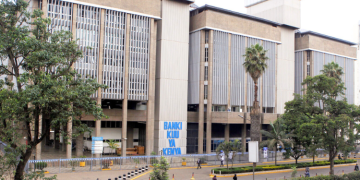The German Federal Foreign Office has issued an advisory cautioning its citizens residing in and traveling to Kenya about an increased risk of terrorism, particularly in busy public spaces such as hotels, shopping malls, and transportation hubs.
In the advisory issued on Tuesday, October 14, the German Federal Foreign Office noted that areas close to the Somali border, such as Lamu County, have been flagged as high-risk regions due to the presence of active terrorist cells.
“There is an increased risk of terrorist attacks in Kenya. The Somali Al-Shabaab terrorist organization has threatened retaliatory actions in response to the participation of the Kenyan armed forces in the AUSSOM mission (formerly ATMIS) in Somalia,” the foreign office stated.
“Several attacks and a series of foiled attacks have demonstrated the terrorists’ determination. Government buildings, hotels, bars and restaurants, shopping malls, church facilities, public transport such as buses, minibusses, ferries, airports, and other high-traffic facilities are among the places with increased risk.”
Germany Issues Travel Advisory
The German Foreign Office listed several locations across Baringo, Laikipia, Samburu, Turkana, and West Pokot counties deemed unsafe for travel.
According to the advisory, travel to Korkoron Hills, Tandare Valley, and Silale Gorges in Baringo County is strongly discouraged.
German citizens have also been warned against traveling to Mukogodo Forest, Kamwenje, Warero, and Ndonyoriwo, Lekuruki Hills, Losos and Kiape Caves, and Sieku Valley in Laikipia County.
In Samburu County, citizens have been warned to avoid the Ltungai Conservancy, Longewan, Nasuur, Lochokia, and Lekadaar Escarpments, the Lolmolok Caves, the Pura Valley, the Malaso Escarpment, and the Suguta Valley.
The advisory further lists Kapebok, Nakwamoru, Lebokat, Ombollion, Nadome, and Kamur Caves in Turkana County, as well as the Turkwell Escarpment at the intersection of West Pokot and Turkana counties, as areas to avoid.
Also Read: Nairobi County Issues Health Advisory for CBD Area
Trips to areas within approximately 100 kilometers of the Somali border, including Lamu County, as well as non-essential travel to Lamu Island and Manda Island, have been strongly discouraged.
“Lamu Island and Manda Island have not yet been the target of attacks. However, there is an increased emergence of active terrorist cells that are advancing as far as the vicinity of the archipelago,” the department warned.
Travelers to the Lamu Archipelago have been advised to take extra precautions and use air transport only.
The German Foreign Office has also urged its citizens to exercise heightened caution while staying in or traveling to remote areas and secondary routes along Kenya’s coastal region, citing an increased risk of kidnapping and attacks.
The advisory further urged citizens to remain alert in busy places and to avoid large gatherings whenever possible.
“For unavoidable trips by car to the northern and northeastern parts of Kenya, the coastal region north of Malindi, the Northeast Province, as well as the northern coastal province – especially to Lamu – be sure to seek protection in a guarded convoy,” the advisory read further.
Also Read: UK Issues New Travel Advisory for Its Citizens Residing and Travelling to Kenya
Safety Risks in Nairobi, Mombasa, and Border Regions
The Foreign Office also noted that sporadic criminal activity has been reported in border areas between Kenya and Tanzania, particularly around the Maasai Mara, Lake Natron, Namanga, and Amboseli Park regions.
German citizens have been advised to avoid certain Nairobi neighborhoods such as Eastleigh, Pangani, and informal settlements, as well as the Dadaab and Kakuma refugee camps. They are also cautioned against visiting the inner cities of Nairobi and Mombasa at night.
Additionally, the advisory urges citizens to visit Mombasa’s Old Town only during the day and preferably in the company of people familiar with the area.
Before undertaking individual excursions, travelers are encouraged to seek updated information and risk assessments from travel and hotel managers. They are further advised to securely store money, identification documents, driver’s licenses, and other important papers.
The advisory also recommends prioritizing cashless payments and carrying only the amount of cash needed for the day, while avoiding unnecessary valuables or conspicuous jewelry.
Follow our WhatsApp Channel and X Account for real-time news updates.










































































